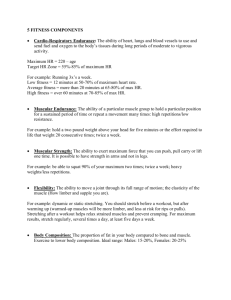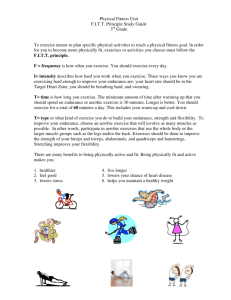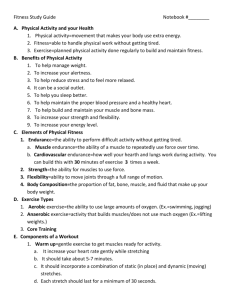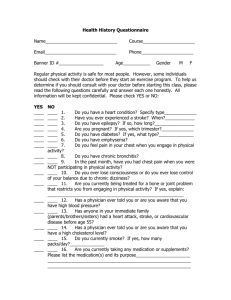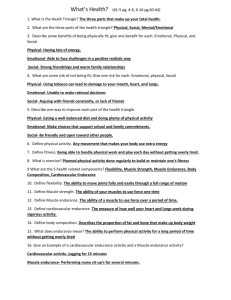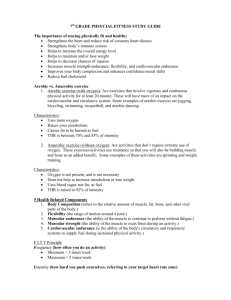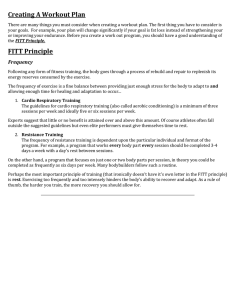MAXIMIZE EFFICIENCY– a time saving workout plan
advertisement
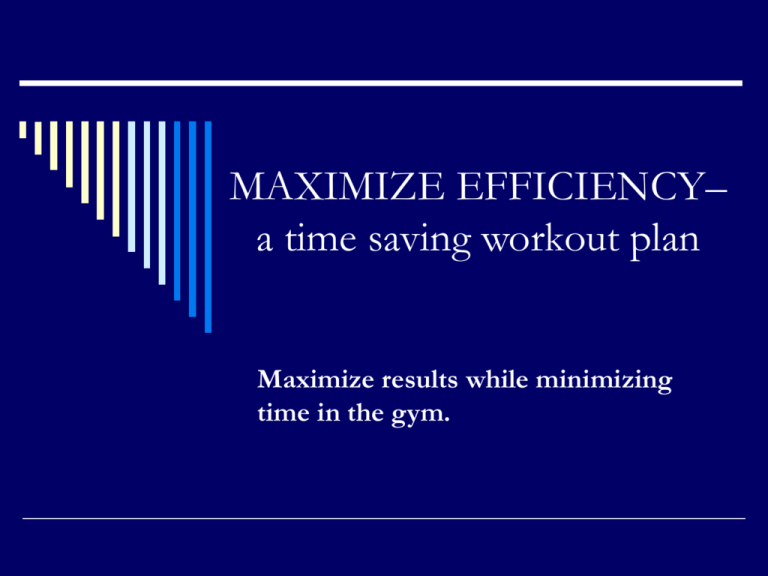
MAXIMIZE EFFICIENCY– a time saving workout plan Maximize results while minimizing time in the gym. TIME is valuable Efficiency should be a major consideration when designing a fitness/strength training program. SET A TRAINING GOAL Appropriate for fitness/skill level Challenging Look forward to MAKE A TRAINING PLAN Several specific do-able activities Specific to your goal Write down a week-by-week program Enjoyable and fits into the rest of your life HOW TO MAKE IT HAPPEN- Combining both cardiovascular and resistance training in the same workout is both effective and efficient ACSM recommends that individuals do both cardiovascular (endurance) training to improve the heart and lungs and resistance training to improve muscular strength. ENDURANCE TRAINING Improve function of heart & lungs Decrease resting heart rate Increase stroke volume Allow body to function more efficiently Decrease risk for heart disease, stroke and diabetes RESISTANCE TRAINING Improve muscle tone Increase connective tissue strength Increase bone density Improve muscle energy capacity Increase fat-free weight and decrease body fat Additional muscle mass may increase resting metabolism CONCURRENT RESISTANCE & ENDURANCE TRAINING Resistance Training - Increases strength - Increase muscle size Endurance Training - Decreases strength - Decrease muscle fiber size Interactions between these two types of training depends on a number of factors- Current fitness level Training modes Training intensity Duration Frequency Integration of the two training modes CONCURRENT TRAINING For beginners, concurrent training effects strength gains more than cardiovascular gains For endurance trained participants, resistance training does NOT effect strength development and MAY improve cardiovascular endurance AMOUNT OF EXERCISE ENDURANCE To improve cardiovascular fitness, exercise should be done 3- 5 days per week, for 20- 60 minutes, at an intensity of 40- 85% maximal heart rate RESISTANCE To improve strength of muscles exercised, perform 8 to 10 exercises at least twice per week (upper & lower body) TRAINING ORDER When performing concurrent resistance & endurance training, most research recommends resistance training followed by endurance training BUT. . . this depends on your GOALS If your goal is to maximize weight loss or increase fat-free mass, then ENDURANCE 1st If your goal is to increase muscle mass, then perform RESISTANCE exercises 1st SEQUENCE OF EXERCISES STRENGTH programs should begin with exercises that use the largest muscles 1st If combining cardiovascular and strength training in the same workout, consider your goals TRAINING INTENSITY The greater the INTENSITY (effort), the better the response RESISTANCE High level of intensity=performing each exercise to the point of muscular fatigue ENDURANCE Incorporate high intensity intervals into the workout PROGRESSIVE OVERLOAD If a muscle is to increase in size, it must be forced to do progressively harder work. To overload the muscles, progressively increase either the WEIGHT or REPETITIONS. Each time the maximum amount of repetitions are attained, resistance should increase NUMBER OF SETS On set of exercises to failure is a popular and effective method of strength training If doing one set of an exercise produces the same results as two or three sets, then a oneset protocol is an EFFICIENT way to train HOW MANY REPETITIONS? A muscle must be worked a certain amount of time to increase size and strength. Optimal time (6 seconds per rep): 90- 120 second glutes 15- 20 reps 60- 90 seconds lower body 10- 15 reps 70 seconds upper torso 6- 12 reps PROPER TECHNIQUES Weight should be raised in a deliberate, controlled manner without jerking movements. Pause in the position of full muscle contraction Emphasize the lowering of the weight makes the exercise more efficient Perform with the greatest possible range of motion that safety allows DURATION OF WORKOUT More does NOT necessary mean better when it comes to resistance training. If you increase length of an activity, you must also decrease your level of effort Efficient strength training is achieved with a minimum amount of recovery between exercises VOLUME OF EXERCISES A comprehensive strength-training workout can be performed using 14 exercises or less Focus on major muscle groups (hips, hamstrings, quadriceps, calves, biceps, triceps, abdominals, shoulders and lower back May also include exercises for sport specific activities QUALITY VS. QUANTITY When it comes to strength training, more is NOT necessarily better Emphasize the QUALITY of work TRAINING SMARTER TIPS Set & accomplish quick and easy goals Track your progress Train with a partner Trade exercise duration for intensity Get good advice QUESTIONS? Don’t put off till tomorrow what you can do TODAY!!
